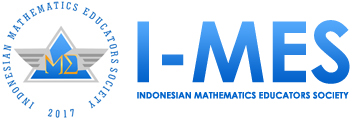Responsible Subversion and the Importance of Local (Emic) Knowledge in Ethnomathematics
Abstract
Keywords
Full Text:
PDFReferences
Ascher, M. (2002). Mathematics elsewhere: an exploration of ideas across cultures. Princeton, NJ: Princeton University Press.
Anderson, S. E. (1997). Worldmath curriculum: fighting Eurocentrism in mathematics. Powell, A. B., & Frankenstein. (Eds.), Ethnomathematics: challenging Eurocentrism in mathematics education (pp. 291-306). Albany, NY: SUNNY.
Anderson, D. (2007). Multicultural group work: a force for developing and healing. The Journal for Specialists in Group Work, 32(3), 224–244.
Cheng, Y. C. (2005). New paradigm for re-engineering education. New York, NY: Springer.
Cortes, D. P. O. (2017). Re-significando os conceitos de função: um estudo misto para entender as contribuições da abordagem dialógica da etnomodelagem [Re-signifying function concepts: a mixed methods study to understand the contributions of dialogic approach of ethnomathematics]. Dissertação de mestrado. Departamento de Educação Matemática. Ouro Preto, MG: UFOP.
D’Ambrosio, U. (1985). Ethnomathematics and its place in the history and pedagogy of mathematics. For the Learning of Mathematics, 5(1)1, 44-48.
D’Ambrosio. U. (2006). The program ethnomathematics and the challenges of globalization. Circumscribere: International Journal for the History of Science, 1, 74-82.
D’Ambrosio, B. S., & Lopes, C. E. (2015). Creative insubordination in Brazilian mathematics education research. Raleigh, NC: Lulu Press.
Dossey, J. A. (1992). The nature of mathematics: its role and its influence. In: D. A. Grouws (Ed.). Handbook of research on mathematics teaching and learning: a project of the national council of teachers of mathematics (pp. 39-48). New York, NY: Macmillan.
Duarte, C. G. (2004). Implicações curriculares a partir de um olhar sobre o mundo da construção civil [Curricular implications related to the of world civil construction]. In: Knijnik, G., Wanderer, F. & Oliveira, C. J. (Eds.). Etnomatemática: currículo e formação de professores [Ethnomathematics: curriculum and teacher education] (pp. 195-215). Santa Cruz do Sul, RS, Brazil: EDUNISC.
Fitzsimons, G. A. (2003). What counts as mathematics? Technologies of power in adult and vocational education. ZDM, 35(6), 323-324.
Haynes, E. A., & Licata, J. W. (1995). Creative insubordination of school principals and the legitimacy of the justifiable. Journal of Educational Administration, 33(4), 21-35.
Helfrich, H. (1999). Beyond the dilemma of cross-cultural psychology: Resolving the tension between etic and emic approaches. Culture and Psychology, 5, 131–153.
Hutchinson, S. A. (1990). Responsible subversion: a study of rule-bending among nurses. Scholarly Inquiry for Nursing Practice, 4(1), 1-3.
Khondker, H. H. (2004). Glocalization as globalization: evolution of a sociological concept. Bangladesh e-Journal of Sociology, 1(2), 1-9.
Kloos, P. (2000). The dialectics of globalization and localization. In: D. Kalb, M. van der Land, R. Staring, B. van Steenbergen & N. Wilterdink (Eds.), The ends of globalization: bringing society back in (pp. 281-298). Lanham, MD: Rowman & Littlefield.
Lloyd, J. C. (2011). For clues to HAI prevention, seek out positive deviance. Healthcare Purchasing News, 35(1), 46-47.
Mesquita, A. P. S. S. (2020). Uma ação pedagógica para o desenvolvimento de conteúdos matemáticos em uma comunidade periférica [A pedagogical action for the development of mathematical content in a peripheral community]. Dissertação de Mestrado em Educação Matemática. Departamento de Educação Matemática. Ouro Preto, MG: Universidade Federal de Ouro Preto – UFOP.
Orey, D. C. (2000). The ethnomathematics of the Sioux tipi and cone. In: Selin, H. (Ed.), Mathematics across culture: the history of non-western mathematics (pp. 239-252). Dordrecht, The Netherlands: Kluwer Academic Publishers.
Orey, D. C., & Rosa, M. (2014). How we came to use a combination of emic, etic, and dialogical approaches in the field research ethnomodeling. In: Manuel Murillo Tsijli. (Org.), Memória IX Festival Internacional de Matemática (pp. 167-179). Quepos, Costa Rica: CIENTEC.
Orey, D. C., & Rosa, M. (2021). Glocalization of cultural practices through ethnomodelling. In: Leung, F. K. S., Stillman, G. A., Kaiser, G., Wong, K. L. (Eds.), Mathematical modelling education in east and west (pp. 55-65). International Perspectives on the Teaching and Learning of Mathematical Modelling. Cham, Switzerland: Springer.
Pinheiro, R. C. (2017). Contribuições do programa etnomatemática para o desenvolvimento da educação financeira de alunos Surdos que se comunicam em Libras [Contributions of the ethnomathematics program to the development of financial education of Deaf students who communicate in the Brazilian sign language]. Dissertação de Mestrado. Departamento de Educação Matemática. Ouro Preto, MG: UFOP.
Rosa, M. (2010). A mixed-methods study to understand the perceptions of high school leader about English language learners (ELL): the case of mathematics. Doctorate dissertation. College of Education. Sacramento, CA: California State University, Sacramento - CSUS.
Rosa, M., & Orey, D. C. (2012). O campo de pesquisa em etnomodelagem: as abordagens êmica, ética e dialética [The research field in ethnomodeling: emic, etic, and dialectical approaches]. Educação e Pesquisa, 38(4), 865-879.
Rosa, M., & Orey, D. C. (2013). Ethnomodeling as a research theoretical framework on ethnomathematics and mathematical modeling. Journal of Urban Mathematics Education, 6(2), 62-80.
Rosa, M., & Orey, D. C. (2015). Evidence of creative insubordination in the research of pedagogical action of ethnomathematics program. In D'Ambrosio, B. S.; & Lopes, C. E. (Orgs.), Creative insubordination in Brazilian mathematics education research (pp. 131-146). Raleigh, NC: Lulu Press.
Rosa, M., & Orey, D. C. (2016a). Ethnomodelling: exploring glocalization in the contexts of local (emic) and global (etic) knowledges. International Journal for Research in Mathematics Education, 6(1), 196-218.
Rosa, M., Orey, D. C. (2016b) Humanizing mathematics through ethnomodelling. Journal of Humanistic Mathematics, 6(3), 3-22.
Rosa, M., Orey, D. C. (2018). Reflecting on glocalization in the contexts of local and global approaches through ethnomodelling. Educação Matemática Pesquisa, 20(2), 171-201.
Rosa, M., & Orey, D. C. (2019). Ethnomathematics and the responsible subversion of its pedagogical action: an investigation based on three anthropological approaches. Revista Brasileira de Estudos Pedagógicos, 100(254), 191-209.
Rosa, M., & Orey, D. C. (2021). Positive deviance in the pedagogical action of ethnomodelling. In: Leung, F. K. S., Stillman, G. A., Kaiser, G., Wong, K. L. (Eds.), Mathematical modelling education in east and west (pp. 67-77). International Perspectives on the Teaching and Learning of Mathematical Modelling. Cham, Switzerland: Springer.
Ruggiero, E. D. D. (2020). Etnomodelagem e café: propondo uma ação pedagógica para a sala de aula [Ethnomathematics and coffee: proposing a pedagogical action for classrooms]. Dissertação de Mestrado em Educação Matemática. Departamento de Educação Matemática. Ouro Preto, MG: Universidade Federal de Ouro Preto - UFOP.
Sue, D. W., & Sue, D. (2003). Counseling the culturally diverse: theory and practice. New York, NY: John Wiley & Sons.
Refbacks
- There are currently no refbacks.

This work is licensed under a Creative Commons Attribution-NonCommercial-ShareAlike 4.0 International License.
Indonesian Journal of Ethnomathematics
Indonesian Mathematics Educators Society
Jl. Terusan Jend. Sudirman, Kec. Cimahi Tengah, Kota Cimahi, Jawa Barat 40521
E-mail: [email protected]
ISSN: 2775-8001


